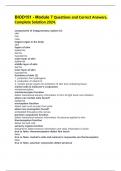-
1. Exam (elaborations) - Biod 151 module 1 questions and correct answers, complete solution 2024.
-
2. Exam (elaborations) - Biod 151 module 2 questions and correct answers. complete solution 2024.
-
3. Exam (elaborations) - Biod151 module 3 exam questions and correct answers, complete solution 2024.
-
4. Exam (elaborations) - Biod 151 module 6 exam 2024 | biod151 m6 exam _graded a - portage learning
-
5. Exam (elaborations) - Portage learning biod 101 module 1 exam questions with complete solutions verified gr...
-
6. Exam (elaborations) - Portage learning biod 101 module 2 exam questions and answers with complete solutions...
-
7. Exam (elaborations) - Portage learning biod 101 module 6 exam questions with complete solutions 100% verifi...
-
8. Exam (elaborations) - portage learning biod 101 module 3 exam actual questions with complete solutions ver...
-
9. Exam (elaborations) - portage learning biod 101 module 4 exam questions with complete solutions verified 1...
-
10. Exam (elaborations) - biod 152 portage learning exam questions with complete 100% verified answers graded ...
-
11. Exam (elaborations) - Biod 102 portage learning exam questions with complete solutions graded a++
-
12. Exam (elaborations) - Portage learning - final biod 152 exam questions with complete solutions verified gra...
-
13. Exam (elaborations) - Portage learning biod 101 module 4 exam questions with complete solutions
-
14. Exam (elaborations) - Biod 151 module 1 exam questions and correct answers.
-
15. Exam (elaborations) - Biod 151 module 1 exam questions and answers, complete solution.
-
16. Exam (elaborations) - Biod 151 module 2 questions and correct answers with complete solution 2024. 118 ques...
-
17. Exam (elaborations) - Biod 151 module 3 exam questions and correct answers, 100% correct.
-
18. Exam (elaborations) - Biod151 module 3 questions and correct answers, complete verified solution, 2024.
-
19. Exam (elaborations) - Biod 151 module 4 exam questions and correct answers, 2024. complete solution.
-
20. Exam (elaborations) - Biod151 - module 5 summary, complete solution with pictures and diagrams for your mod...
-
21. Exam (elaborations) - Biod 151- module 5 questions and correct answers, with complete solution, updated 202...
-
22. Exam (elaborations) - Biod 151 module 6 exam questions and correct answers, with complete solution 2024.
-
23. Exam (elaborations) - Biod151 - module 6 questions and correct answers, with complete solution updated 2024...
-
24. Exam (elaborations) - Biod 151 module 7 exam questions and correct answers with complete solution, 2024.
-
25. Exam (elaborations) - Biod151 - module 7 questions and correct answers, complete solution 2024.
-
26. Exam (elaborations) - Biod 151 module 7 questions and correct answers, complete solution 2024.
-
27. Exam (elaborations) - Biod 151 module 7 - integumentary system (summary) questions with complete solutions ...
-
28. Exam (elaborations) - Biod 151 - final exam questions and answers, with pictorial diagrams, complete soluti...
-
29. Exam (elaborations) - Final exam biod 151 questions and correct answers.
-
30. Exam (elaborations) - Portage biod 151 final exam questions and correct answers.
-
31. Exam (elaborations) - Biod 151 final exam questions and correct answers, 346 questions to prepare for your ...
-
32. Exam (elaborations) - Biod 151 lab 2 exam questions with complete solutions verified graded a+
-
33. Exam (elaborations) - Biod 151 lab 3 key terms (portage) exam questions and verified complete solutions 100...
-
34. Exam (elaborations) - Biod 151 lab 4 terms exam questions and answers with correct verified solutions 2024
-
35. Exam (elaborations) - Lab 5 biod 151 exam questions with complete verified solutions graded a+ already pass...
-
36. Exam (elaborations) - biod 151 module 6 lab 6 exam questions and answers with complete 100% verified solut...
-
Show more




